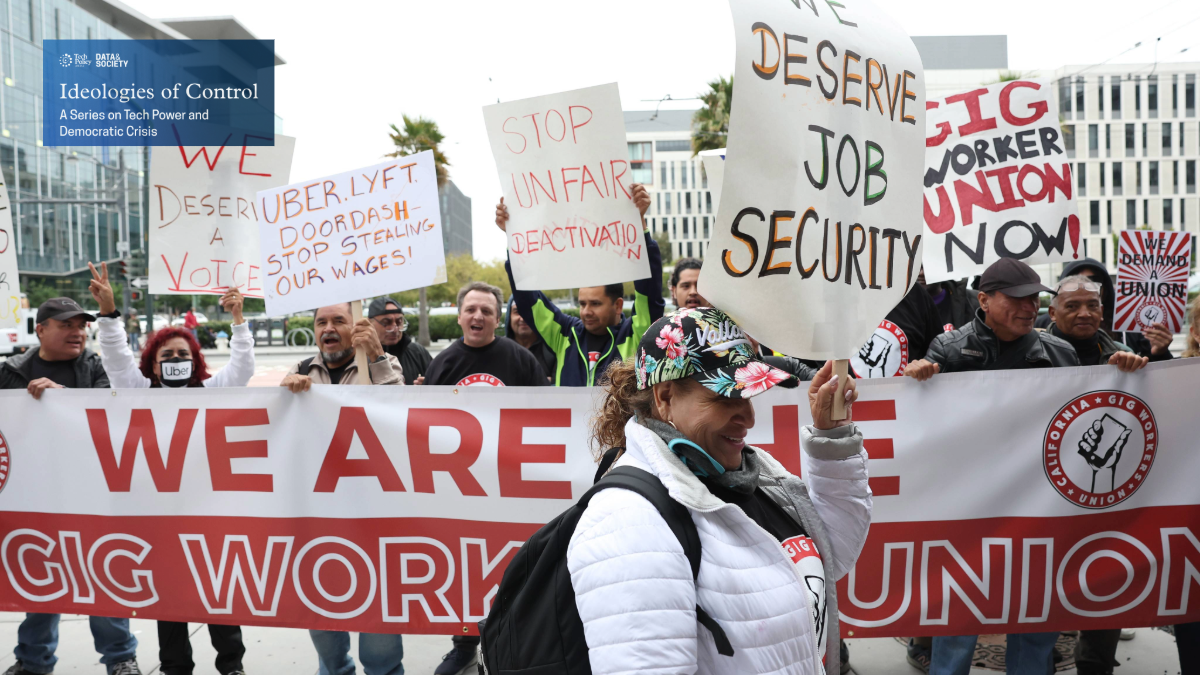AI, Gig Workers, and the Erosion of Democracies
Luca Belli / Jun 4, 2025This piece is part of “Ideologies of Control: A Series on Tech Power and Democratic Crisis,” in collaboration with Data & Society. Read more about the series here.

SAN FRANCISCO, CALIFORNIA—Delivery drivers and gig workers hold signs as they protest in front of Uber headquarters on October 12, 2022 in San Francisco, California. (Photo by Justin Sullivan/Getty Images)
In recent months, we have seen a significant shift in how the biggest Silicon Valley companies relate to Trump's second presidency. While in the first term, tech CEOs were at the forefront of assuring their employees and shareholders that nothing would change for them during Trump’s first presidency, this time around, they were some of the first to preemptively make changes both to their policies and to the internal culture. There has also been noticeable silence on the part of tech workers, whereas employee activism and organizing were salient during the first Trump administration.
As Wendy Brown argues, the current authoritarian turn reflects in part the belief among some elites that if “white men cannot own democracy, there will be no democracy.” Indeed, the current wave of reactionary politics among Silicon Valley elites stems from the resentment that many tech leaders feel about the political engagement and intransigence of large parts of their highly paid and, according to them, pampered liberal workers. Free food and snacks, equity grants, and high salaries are meant to attract competitive engineering talent, but also to buy political acquiescence, silence, and obedience. “Shut up and code” is the new management mantra.
In this new environment, the tech broligarchy and ideologues like Marc Andreessen can finally assert their authority with the masks off. Their demand: unquestioned, outright rule by venture capital and CEOs. At the same time, they seek to be praised as visionary problem-solvers, even as their efforts contribute to the erosion of democracy, the expansion of surveillance, and the destruction of any semblance of a social safety net. Additionally, their goals for AI seem to involve transforming the entire working class into the precariat by making all jobs gig-based. Meanwhile, there is a vast, precarious, marginalized global underclass of exploited workers who label, annotate, content moderate, and in general enable all of our Western AI wonders.
This remaking of government, the economy, and society is justified under the guise that everything must be made more efficient, an aspiration that Silicon Valley shares with the fascists of the past, from Mussolini’s on-time trains to Hitler’s elimination of all unemployment. The fantasy of AI boosters is that AI will "solve" all economic and social problems. It is the efficiency of and for the algorithm, not for the people. The (un)spoken goal is to have as few workers as possible who are as obedient as possible.
The recent ubiquity of large language models is making it possible for companies' executives to shift the labor market back to their advantage after it was more favorable to engineers. Until two years ago it was not uncommon for a skilled engineer to demand high salaries, including stock options that could potentially be worth millions of dollars.
Now, CEOs can convince themselves that they can run companies with fewer spoiled engineers, because of the “AI productivity boost.” Coupled with a lower union membership rate among tech workers than the nation's average, the resulting uncertainty makes internal organizing in companies less likely, as everyone wants to be quiet to keep their job. Shareholders can rejoice as less worker organizing means fewer problems for companies: no one complaining about selling technology to the military, no one asking questions if POTUS was given too much latitude on Twitter, or demanding more investment in green energy. And if the people who work the closest with this technology don't get a say in it, who will? The tech CEOs are not going to save us: they already have plans to live in luxury bunkers, or maybe just escape to Mars.
The fact that a small group of extremely wealthy individuals is fighting against workers' rights, trying to influence policy, and colluding among themselves is nothing new: Robber barons such as Carnegie, Rockefeller, Vanderbilt, and Morgan have charted this course before. This time seems different—not because of the amount of wealth, influence, and power accumulated, but because their rise has been actively encouraged by policymakers and those in charge of protecting the public’s interests.
Modern tech companies were able to expand to their current size against the backdrop of two trends. On the policy side, neoliberal ideology, favoring free and unregulated markets, minimum to no government regulation, and privatized services, went from a set of niche academic ideas to mainstream discourse. These ideas were translated into policies that either deregulated existing industries or didn’t regulate new ones. That helped the small internet start-ups of the early 2000s avoid oversight and expand unchecked into the super-national entities they are today—companies capable of influencing elections, predicting influenza outbreaks, and facilitating genocide.
Secondly, following 9/11, the global public sector, especially in the US, sought to expand surveillance and data collection, coupled with predictive analytics as a means to prevent future attacks. New laws gave the state broad authority to collect data on citizens. However, the collection of data solely by the public sector was insufficient and less useful without adequate tools for interpretation, so the government increasingly turned to private tech companies. The government was more than happy to learn and apply the techniques of surveillance capitalism to mass surveillance. Online platforms, in addition to selling ads, had the opportunity to help surveil their citizens 24/7 in a low-cost, low-personnel, and efficient way.
Gone are the days when the secret police had to open each item of correspondence or listen to conversations to trap political opponents. Companies were willing to sell data and technologies and keep acquiring expertise—unless, of course, workers protested such deals. Today, unregulated tech corporations can supply the data and tools, often without transparency, including regarding the ethics and appropriateness of data usage. As a consequence, the state can defer ethical and legal responsibility to the corporation, while the company can argue it is just following the law.
And of course, companies comply, because it’s good for business. After all, historically, corporations have colluded with power, including fascist regimes, either for business reasons or for fear of retaliation. The primary focus of a CEO’s job is to make sure that the business prospers, regardless of which party is in power. It’s what is called a fiduciary duty.
Now, many of those same corporations are claiming that their AI product will change the world. But who will benefit from such a change? After World War II, both workers' productivity and their compensation increased. However, starting in 1979, an increasingly larger gap formed between the two: in other words, corporations (and their shareholders) absorbed most of the gains in productivity, leaving workers behind.
The result, good jobs—jobs with healthcare, predictable hours, pensions, good salary, and other protections—are becoming rarer, in favor of a more unstable, high-stress, and less desirable ones. That's why the American dream of buying a house and sending two kids to college on a single salary is unattainable in today’s society. The disappearance of such jobs not only has economic consequences, but also social ones. People with less stable jobs are less likely to vote and to participate in the democratic process. The lack of unions is also concerning, as they are a tool to increase participation and strengthen trust in public institutions.
The current wave of AI development is accelerating, bringing the trend to an extreme. The working class is constantly under attack, being replaced by unstable gig jobs, which one would need many of, usefully rebranded as entrepreneurial, to convince us that everyone is just a good idea away from becoming a multi-millionaire. Unless we demand action from our policymakers, this could have far-reaching and long-lasting consequences for our democracies.
The author would like to thank an anonymous expert for their input and contribution to this article.
Authors
